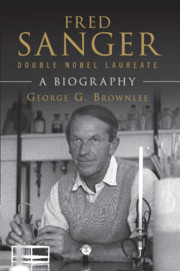Book contents
- Frontmatter
- Dedication
- Contents
- List of figures
- Foreword
- Acknowledgements and original sources
- Brief chronology
- Honours
- Introduction
- 1 A Quaker upbringing
- 2 How about studying insulin?
- 3 Radioactive sequencing of proteins and nucleic acids
- 4 Interview of Fred by the author in 1992: Early life
- 5 Interview of Fred by the author in 1992: Insulin and the Biochemistry Department, University of Cambridge
- 6 Interview of Fred by the author in 1992: Nucleic acids at the MRC Laboratory of Molecular Biology, Cambridge
- 7 Post-Sanger sequencing: high-throughput automated sequencing
- 8 Cancer: the impact of new-generation sequencing
- 9 Commentaries on Fred Sanger’s scientific legacy
- Epilogue
- Appendix: Complete bibliography of Fred Sanger
- Notes
- Index
- Plates
Epilogue
Published online by Cambridge University Press: 05 November 2014
- Frontmatter
- Dedication
- Contents
- List of figures
- Foreword
- Acknowledgements and original sources
- Brief chronology
- Honours
- Introduction
- 1 A Quaker upbringing
- 2 How about studying insulin?
- 3 Radioactive sequencing of proteins and nucleic acids
- 4 Interview of Fred by the author in 1992: Early life
- 5 Interview of Fred by the author in 1992: Insulin and the Biochemistry Department, University of Cambridge
- 6 Interview of Fred by the author in 1992: Nucleic acids at the MRC Laboratory of Molecular Biology, Cambridge
- 7 Post-Sanger sequencing: high-throughput automated sequencing
- 8 Cancer: the impact of new-generation sequencing
- 9 Commentaries on Fred Sanger’s scientific legacy
- Epilogue
- Appendix: Complete bibliography of Fred Sanger
- Notes
- Index
- Plates
Summary
Fred Sanger retired in 1983 aged 65. Many people thought this was too early and that the Director then, Sydney Brenner, should perhaps have persuaded him to stay on at the laboratory. After all he was the most high-profile scientist at the lab. But Sanger himself felt it was the right time to retire. He had reached the pinnacle of his career. He had just won his second Nobel Prize. A third Nobel Prize was out of reach even for a man of Sanger’s determination, focus and energy. His work had paved the way for sequencing the human genome. Fred said his capacity for working at the bench and doing experiments was waning and space should be given to someone younger. Fred was to apply his remaining energy to his much larger garden when he and his wife, Joan, moved from Hills Road, Cambridge to ‘Far Leys’ (named in memory of his childhood home near Birmingham) in Swaffham Bulbeck outside Cambridge in the Fens. Here he was to grow roses, fruit trees, soft fruit, a vine cutting I gave him, along with his many other specimen flowers in his herbaceous borders. He also had time now to spend more time enjoying his hobby of sailing and watching his grandchildren, the children of his second son, Peter, grow up.
The overriding question, the central question in this biography, is why was Fred Sanger so successful as a scientist. What attributes allowed him to succeed twice on two different but fundamental problems and gain two Nobel Prizes? Was it his personal attributes? Was it the influence of his parents and education at school? Was it his own early career in the Department of Biochemistry in Cambridge where he started science? Was it his choice of the scientific problem or his choice of collaborators? Was it in his DNA? Was he perhaps just lucky to be awarded two Nobel Prizes?
- Type
- Chapter
- Information
- Fred Sanger - Double Nobel LaureateA Biography, pp. 167 - 170Publisher: Cambridge University PressPrint publication year: 2014



